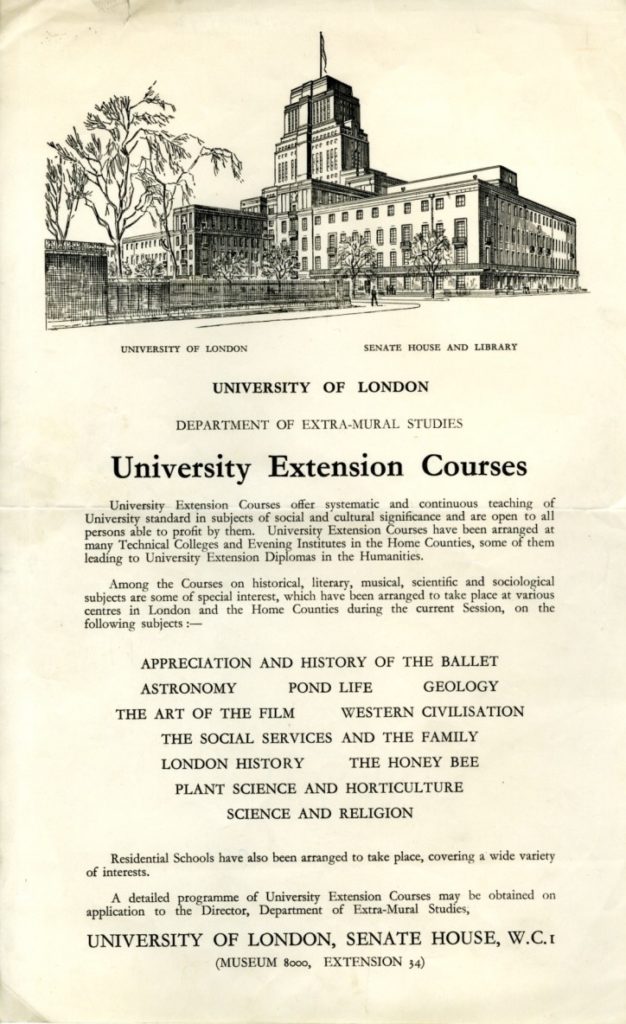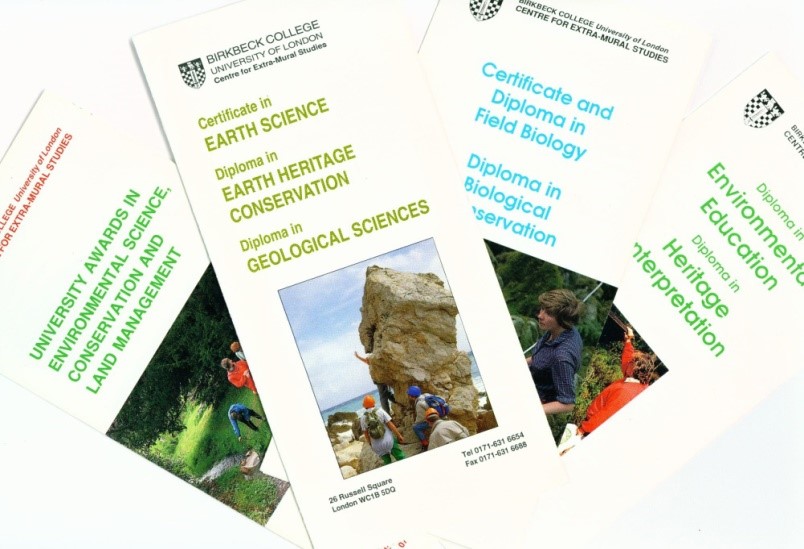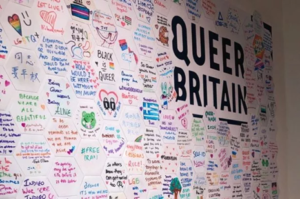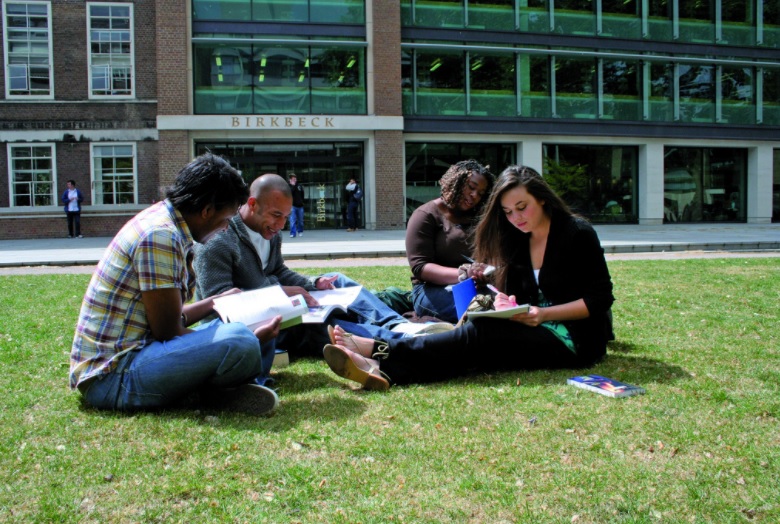In 2023, Birkbeck celebrates its 200th anniversary. In this blog, Richard Clarke, a researcher, discusses how the College developed its extra-mural provision from the end of the Second World War to the beginning of the 21st century.
One hugely significant event in the post-1945 history of Birkbeck College was its amalgamation with the (federal) University of London Department of Extra-Mural Studies (DEMS, or, simply ‘Extra-Mural) in 1988. Then, almost all of the (pre-1992) British universities had some form of ‘outreach’ unit, charged with delivering their scholarship to a wider audience, and these tended to fall into one of two categories, both funded directly by the state under the 1944 Education Act.
 One was the (Cambridge) ‘university extension’ model which typically involved academics travelling to deliver their expertise some distance from their university base. Launched in 1873 and focused first on northern manufacturing cities, it reached London with the establishment of the London Society for the Extension of University Teaching (LSEUT) in 1876. The other, beginning in 1878, was derived from a parallel (Oxford) ’tutorial classes’ model in which tutors (not ‘lecturers’) were provided by the university but the syllabus was negotiated with students themselves. Courses were typically delivered in collaboration with other organisations including the Workers’ Educational Association (WEA, founded in 1903). This provided two distinct traditions in tertiary level adult education, manifest variously in different university extra-mural departments.
One was the (Cambridge) ‘university extension’ model which typically involved academics travelling to deliver their expertise some distance from their university base. Launched in 1873 and focused first on northern manufacturing cities, it reached London with the establishment of the London Society for the Extension of University Teaching (LSEUT) in 1876. The other, beginning in 1878, was derived from a parallel (Oxford) ’tutorial classes’ model in which tutors (not ‘lecturers’) were provided by the university but the syllabus was negotiated with students themselves. Courses were typically delivered in collaboration with other organisations including the Workers’ Educational Association (WEA, founded in 1903). This provided two distinct traditions in tertiary level adult education, manifest variously in different university extra-mural departments.
London University DEMS was unique in that it consisted of two ‘Responsible Bodies’, each separately funded under the 1926 University of London Act which established its governing University Extension and Tutorial Classes Council (UETCC). Both grew rapidly in the decades following the end of the Second World War. The ‘Extension Section’ delivered a programme comprised mainly of accredited Certificates and Diplomas – everything from archaeology to religious studies, and it included several relatively autonomous vocational units, notably in nursing, in social work and in transport studies. The other, the ‘Tutorial Classes Section’, focussed principally on non-accredited classes, covering if anything an even wider range of subjects, mostly delivered in conjunction with what was then a strong network of local WEA branches as well as with trades unions, local community organisations and third-sector organisations. Together with their programme – in terms both of subjects, student numbers and of full-time equivalent (FTE) grant was significantly bigger than that of the College to which the amalgamation brought important additional funding.
 By the time of the London ‘Extra-Mural’ centenary in 1976, Birkbeck College had itself survived more than one crisis. This included a proposal in the 1960s “to change the character of the College from an institution for part-timers and evening students to a college for full-time undergraduate school-leavers, on some green-field site outside central London.” (1). While this was defeated by determined opposition on the part of Birkbeck’s staff and supporters, the consequence was that the College and the federal University’s Extra-Mural department continued their development along parallel, but largely separate paths – the College focussing on high-quality research and part-time degree teaching, and the Department developing an extraordinary diversity of activities beyond its traditional ‘liberal’ core.
By the time of the London ‘Extra-Mural’ centenary in 1976, Birkbeck College had itself survived more than one crisis. This included a proposal in the 1960s “to change the character of the College from an institution for part-timers and evening students to a college for full-time undergraduate school-leavers, on some green-field site outside central London.” (1). While this was defeated by determined opposition on the part of Birkbeck’s staff and supporters, the consequence was that the College and the federal University’s Extra-Mural department continued their development along parallel, but largely separate paths – the College focussing on high-quality research and part-time degree teaching, and the Department developing an extraordinary diversity of activities beyond its traditional ‘liberal’ core.
By the mid-1980s, however, the anomalies had become a major challenge. The independence of ‘extra-mural’ had been an advantage in the early post-War period when degree-level study was restricted to a few; but with the growth of the university sector the lack of connection between extra-mural ‘outreach’ and teaching and research within the University’s walls had become increasingly apparent.
Many of those taking extra-mural certificates and diplomas wished to progress to degrees and postgraduate work but found it easier to do so at universities outside of London. A major growth in the numbers of young – and not-so-young – people going ‘to’ university, reduced the demand for degree-level certificates and diplomas. The success of the Open University had shown that universities do not need to have walls at all; there was a growing demand “to study with and through the University of London but not necessarily at it.”(2) And the establishment of new universities (Essex, Surrey, Kent and later Brunel) all involved a contraction of the London extra-mural area. This nevertheless by the mid-1980s still stretched “north to south from Chorleywood to Croydon and east to west from Southend to Uxbridge.”)(3)
At the same time, the distinction between what went on ‘inside’ and ‘outside’ the walls had become an encumbrance. Staff within the Extra-Mural Department were increasingly developing their own research specialisms and reputations and making, or wishing to make, links with cognate departments within Colleges and Schools. It happened also that the then Master of Birkbeck, George Overend, was also Chair of the Senate Committee of Extra-Mural Studies. In the session 1985-6, a Working Group was established, chaired by Overend, to consider future options for the London DEMS. The Group had only met on a few occasions (its deliberations inclining towards some kind of merger with Birkbeck) when Birkbeck itself suffered a major financial crisis. This led to another committee, chaired by Sir Barney Hayhoe MP, charged specifically with restructuring the College to meet the challenge. The Hayhoe Committee, amongst its other recommendations, endorsed the proposal that DEMS should become part of Birkbeck as one of its new resource centres. The proposal also began to interest the University which had recently appointed Dorothy Wedderburn, the Principal of Royal Holloway and Bedford New College, as its first Pro-Vice Chancellor for Continuing Education, as part of a policy to develop a coherent federal policy in this area. Wedderburn in turn endorsed the proposal for incorporation, and established a formal University Working Party, chaired by Tim Brinton, a lay member of the University Court, to take this forward.
A key proposal of the Brinton report was for ‘complementary development’ of Extra-Mural Certificates and Birkbeck degree programmes. Where cognate provision existed in both institutions, Brinton argued, it should be linked; subjects offered only ‘extramurally’ might stimulate the development of new degree programmes (acting, inter alia, as progression routes for certificate students) or offered as options within existing degrees, and elements of Birkbeck degree programmes not already matched by certificates and diplomas could be offered ‘extra-murally’. In practice, integration did not go nearly as quickly as Brinton envisaged, partly as a consequence of the size of the extra-mural programme and fears of College staff that they might be ‘swamped’; perhaps because of reciprocal fears of ‘absorption’ and ‘dilution’ which had prevented any progress towards a merger in 1976, but also because of the significant organisational barriers to collaboration produced by the new College ‘resource centres’ that arose from the implementation of the Hayhoe Report.
Initially, DEMS was simply incorporated within Birkbeck in 1988 as a semi-autonomous Centre for Extra-Mural Studies (CEMS). Subsequently, when the resource centre structure (introduced by Tessa Blackstone upon her appointment as Master in 1987) was replaced by academic faculties in 1999, it was renamed the Faculty of Continuing Education (FCE) and then in 2007, the Faculty of Lifelong Learning (FLL), throughout still occupying the two buildings; 26-28 Russell Square and 32 Tavistock Square (which hosted the WEA’s regional office on its top floor) to which it had moved in 1975 from its earlier home in Ridgemount Street.
At the end of the 2008-9 academic session — after two decades of semi-autonomous existence (and little more than a year after its change of name from ‘continuing education’ to ‘lifelong learning’) Birkbeck’s FLL, its staff, their teaching and research were finally assimilated into four new ‘super-schools’ alongside colleagues in cognate subjects ‘across the car park’ from their base in Russell Square.
Writing in 1988 on the eve of the incorporation of the ‘Extra-Mural’ Department within Birkbeck, its then Director, Brian Groombridge, had described the incorporation as “one of the most profound structural changes in the Department’s history.”(2). The incorporation reflected the start of much broader changes in the structure of part-time higher education.
One factor was a rise in credentialism – both a demand for certification and an insistence on it by the DES as a condition of funding. ‘Mainstreaming’ – the requirement for formal assessment of learning outcomes for all funded students meant a loss of flexibility in the Tutorial Classes curriculum. This was followed in 2008 by the introduction of the European Qualifications Framework (EQF), implemented in Britain as the National Qualifications Framework (NQF) whereby all awards were referenced to a series of levels and carry a credit rating in the Credit Accumulation and Transfer Scheme (CATS). NQF was accompanied by ‘ELQ’ – the withdrawal in 2007 of funding from students already in possession of a qualification at equivalent (or higher) level than that at which they wished to study. ELQ anticipated the subsequent abandonment of all state funding for liberal adult education by an increasingly instrumentalist neoliberal government. In combination, their consequences (and the end of one of the last remaining university departments of adult and continuing education) may be seen also as the final stage in inexorable erosion of the ‘liberal ethic’ (and of partnership provision) within the university sector.
Paradoxically, the final assimilation of FLL within the new College structure made possible the realisation of some of the possibilities envisaged over two decades previously in the Brinton Report. One of the DES funded innovatory projects already in progress as the 1988 incorporation of DEMS within Birkbeck was underway (and cited in the Brinton Report as potentially beneficial to the outreach capacity of Birkbeck) was an ‘East London Project’, aimed at exploring ways in which the University, through its extra-mural department, might contribute to the social and economic regeneration of the area. Then the collaboration envisaged was with Queen Mary College and the London Docklands Development Corporation; today it is with the (‘new’) University of East London, the London Borough of Newham, and other organisations in the region of the London Olympics and the Thames Gateway, but Stratford East represents in many ways the fulfilment of the opportunities identified in the Brinton Report and by the 1988 incorporation of ‘Extra-Mural’ within Birkbeck.
Other recommendations of the Brinton committee were manifest in different ways. For example, complementary development and integration of certificate and degree programmes were limited in practice to the Certificate in Ecology and Conservation which, in 1988, became a key ‘vertical’ slice through Birkbeck environment degrees, providing an ‘outreach’ element to students who might not otherwise have considered a full degree as well as an exit route for those who had done so but who found the time commitment of three evenings per week too demanding. Other attempts to develop new integrated degrees and certificates by means of newly created joint (extra-intra mural) posts (for example in archaeology, development studies and in science & society) placed an enormous strain on the colleagues appointed, who were not only expected to do far more than their notional fractional allocation to each ‘home’ but had to operate dual incompatible assessment and administrative systems.
At the same time however new awards were developed within the new Centre, in part as a response to – or a defence against – a perception within ‘main College’ that much of its work was of ‘sub-degree’ standard. Several of these new awards were at postgraduate level. Examples included postgraduate diplomas in Environmental Management and in Counselling. Partly because of a concern within the Centre that progressing approval through the College’s academic board might meet with opposition, these were taken through the Council for National Academic Awards (CNAA) route in 1992 – just before the CNAA was itself set up as part of the process of transferring degree awarding powers to the ‘post ‘92’ universities. The CNAA confirmed their rating as postgraduate, and they became the core of new Masters’ awards (the first in the Centre) in 1995.

The Masters in Environmental Management (Countryside and Protected Area Management) and another MSc in Environmental and Heritage Interpretation were particularly significant in that, being taught at weekends (coupled with week-long residential modules elsewhere) they attracted students from well beyond the London area, including Scotland, Switzerland and the USA. Moreover, being ‘national’ in appeal, they attracted sponsorship, so that for a number of years both the then Countryside Commission and The National Trust each funded six scholarships – the former for local authority countryside staff and the latter for the Trust’s own employees.
Today few universities retain a significant level of extra-mural provision – part of the general collapse of liberal, non-vocational adult education.(4) Exceptions include Oxford University’s Department for Continuing Education and Cambridge University’s Institute of Continuing Education. Within Birkbeck, while little of the 1988 ‘outreach’ provision survives today, legacies of the incorporation can be found in the College’s research and teaching, for example in London studies, in links with significant institutions in working-class education such as Toynbee Hall and the Bishopsgate Institute, and in other, now mainstream areas of university provision which were pioneered with DEMS/ FLL. For example, DEMS and – by inheritance, Birkbeck – was the first university institution to recognise women’s studies as a legitimate field of scholarship and teaching, manifest in the appointment of Britain’s first lectureship (Mary Kennedy) in the subject. Extra-mural traditions of radical history and critical science complemented those that had already been pioneered within the College by such prominent individuals as Eric Hobsbawm and J D Bernal. Another legacy is the relatively large number of hourly-paid associated fixed-term ‘teaching and scholarship’ staff which remains a feature of Birkbeck today.
collapse of liberal, non-vocational adult education.(4) Exceptions include Oxford University’s Department for Continuing Education and Cambridge University’s Institute of Continuing Education. Within Birkbeck, while little of the 1988 ‘outreach’ provision survives today, legacies of the incorporation can be found in the College’s research and teaching, for example in London studies, in links with significant institutions in working-class education such as Toynbee Hall and the Bishopsgate Institute, and in other, now mainstream areas of university provision which were pioneered with DEMS/ FLL. For example, DEMS and – by inheritance, Birkbeck – was the first university institution to recognise women’s studies as a legitimate field of scholarship and teaching, manifest in the appointment of Britain’s first lectureship (Mary Kennedy) in the subject. Extra-mural traditions of radical history and critical science complemented those that had already been pioneered within the College by such prominent individuals as Eric Hobsbawm and J D Bernal. Another legacy is the relatively large number of hourly-paid associated fixed-term ‘teaching and scholarship’ staff which remains a feature of Birkbeck today.
- Hobsbawm EJ. ‘Birkbeck and the Left; Concluding address to the 175th Anniversary Appeal Lectures at Birkbeck’. Times Change 2001:14-17.
- Groombridge B. Extra-mural Futures: The Prospects for London. London: University of London Department of Extra-Mural Studies; 1998.
- Brinton Report 1986, unpublished
- Clarke R. ‘‘Really useful’ knowledge and 19th century adult worker education – what lessons for today?’. Theory & Struggle 2016;117:67-74: https://online.liverpooluniversitypress.co.uk/doi/abs/10.3828/ts.2016.17.
Further information:
- Read more of our 200th anniversary blogs














 One was the (Cambridge) ‘university extension’ model which typically involved academics travelling to deliver their expertise some distance from their university base. Launched in 1873 and focused first on northern manufacturing cities, it reached London with the establishment of the London Society for the Extension of University Teaching (LSEUT) in 1876. The other, beginning in 1878, was derived from a parallel (Oxford) ’tutorial classes’ model in which tutors (not ‘lecturers’) were provided by the university but the syllabus was negotiated with students themselves. Courses were typically delivered in collaboration with other organisations including the Workers’ Educational Association (WEA, founded in 1903). This provided two distinct traditions in tertiary level adult education, manifest variously in different university extra-mural departments.
One was the (Cambridge) ‘university extension’ model which typically involved academics travelling to deliver their expertise some distance from their university base. Launched in 1873 and focused first on northern manufacturing cities, it reached London with the establishment of the London Society for the Extension of University Teaching (LSEUT) in 1876. The other, beginning in 1878, was derived from a parallel (Oxford) ’tutorial classes’ model in which tutors (not ‘lecturers’) were provided by the university but the syllabus was negotiated with students themselves. Courses were typically delivered in collaboration with other organisations including the Workers’ Educational Association (WEA, founded in 1903). This provided two distinct traditions in tertiary level adult education, manifest variously in different university extra-mural departments. By the time of the London ‘Extra-Mural’ centenary in 1976, Birkbeck College had itself survived more than one crisis. This included a proposal in the 1960s “to change the character of the College from an institution for part-timers and evening students to a college for full-time undergraduate school-leavers, on some green-field site outside central London.” (1). While this was defeated by determined opposition on the part of Birkbeck’s staff and supporters, the consequence was that the College and the federal University’s Extra-Mural department continued their development along parallel, but largely separate paths – the College focussing on high-quality research and part-time degree teaching, and the Department developing an extraordinary diversity of activities beyond its traditional ‘liberal’ core.
By the time of the London ‘Extra-Mural’ centenary in 1976, Birkbeck College had itself survived more than one crisis. This included a proposal in the 1960s “to change the character of the College from an institution for part-timers and evening students to a college for full-time undergraduate school-leavers, on some green-field site outside central London.” (1). While this was defeated by determined opposition on the part of Birkbeck’s staff and supporters, the consequence was that the College and the federal University’s Extra-Mural department continued their development along parallel, but largely separate paths – the College focussing on high-quality research and part-time degree teaching, and the Department developing an extraordinary diversity of activities beyond its traditional ‘liberal’ core.
 collapse of liberal, non-vocational adult education.(4) Exceptions include Oxford University’s Department for Continuing Education and Cambridge University’s Institute of Continuing Education. Within Birkbeck, while little of the 1988 ‘outreach’ provision survives today, legacies of the incorporation can be found in the College’s research and teaching, for example in London studies, in links with significant institutions in working-class education such as Toynbee Hall and the Bishopsgate Institute, and in other, now mainstream areas of university provision which were pioneered with DEMS/ FLL. For example, DEMS and – by inheritance, Birkbeck – was the first university institution to recognise women’s studies as a legitimate field of scholarship and teaching, manifest in the appointment of Britain’s first lectureship (Mary Kennedy) in the subject. Extra-mural traditions of radical history and critical science complemented those that had already been pioneered within the College by such prominent individuals as Eric Hobsbawm and J D Bernal. Another legacy is the relatively large number of hourly-paid associated fixed-term ‘teaching and scholarship’ staff which remains a feature of Birkbeck today.
collapse of liberal, non-vocational adult education.(4) Exceptions include Oxford University’s Department for Continuing Education and Cambridge University’s Institute of Continuing Education. Within Birkbeck, while little of the 1988 ‘outreach’ provision survives today, legacies of the incorporation can be found in the College’s research and teaching, for example in London studies, in links with significant institutions in working-class education such as Toynbee Hall and the Bishopsgate Institute, and in other, now mainstream areas of university provision which were pioneered with DEMS/ FLL. For example, DEMS and – by inheritance, Birkbeck – was the first university institution to recognise women’s studies as a legitimate field of scholarship and teaching, manifest in the appointment of Britain’s first lectureship (Mary Kennedy) in the subject. Extra-mural traditions of radical history and critical science complemented those that had already been pioneered within the College by such prominent individuals as Eric Hobsbawm and J D Bernal. Another legacy is the relatively large number of hourly-paid associated fixed-term ‘teaching and scholarship’ staff which remains a feature of Birkbeck today.








